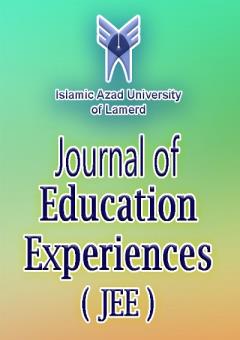Validation of the Professional Technology Competencies Model for Elementary School Principals
محورهای موضوعی : 0مرضيه طهماسبي 1 , پري مشايخ 2 , مسلم صالحی 3
1 - دانشجوي دوره دكتري مديريت آموزشي، واحد كازرون، دانشگاه آزاد اسلامي، كازرون، ايران
2 - استاديار گروه علوم تربيتي، واحد كازرون، دانشگاه آزاد اسلامي، كازرون، ايران
3 - دانشگاه آزاد اسلامی مرودشت
کلید واژه: Professional qualifications, technology, primary education managers,
چکیده مقاله :
Introduction: The main objective of this study was to validate the model of technological professional qualifications of elementary school principals in Fars province.
Methodology: The method of conducting this research was descriptive survey. The research population in the quantitative part was managers working in primary education in Fars province, which according to the obtained statistics was 3950 people, of which 351 people had to be selected based on the Morgan and Krejsi table. Initially, 6 cities from Fars province were randomly selected using the multi-stage cluster sampling method. The main tool in the quantitative part was a researcher-made questionnaire taken from the qualitative part, the indicators of which were adjusted and compiled under the supervision of the supervisor and consultant, and after assessing the face validity, the content validity was estimated. The content validity of the tool was estimated with the Lawshe coefficient. To measure the reliability of the research tool, Cronbach's alpha was used and it was obtained above. /7.
Findings: In the qualitative part, a model of school principals' technological competence was developed, which consisted of 67 basic themes, 15 organizing themes, and six comprehensive themes. The results of the quantitative part showed that the square of the convergent validity of each construct was greater than the correlation values between other constructs, so the research model was confirmed in terms of divergent validity according to the Fornell and Larker method. Also, the SRMR index was equal to 0.066, which indicates a high fit of the model
Conclusion: It can be concluded that improving the technological competence of school principals can provide the basis for the appropriate use of modern educational technologies for all factors affecting education and those affected by education.
Introduction: The main objective of this study was to validate the model of technological professional qualifications of elementary school principals in Fars province.
Methodology: The method of conducting this research was descriptive survey. The research population in the quantitative part was managers working in primary education in Fars province, which according to the obtained statistics was 3950 people, of which 351 people had to be selected based on the Morgan and Krejsi table. Initially, 6 cities from Fars province were randomly selected using the multi-stage cluster sampling method. The main tool in the quantitative part was a researcher-made questionnaire taken from the qualitative part, the indicators of which were adjusted and compiled under the supervision of the supervisor and consultant, and after assessing the face validity, the content validity was estimated. The content validity of the tool was estimated with the Lawshe coefficient. To measure the reliability of the research tool, Cronbach's alpha was used and it was obtained above. /7.
Findings: In the qualitative part, a model of school principals' technological competence was developed, which consisted of 67 basic themes, 15 organizing themes, and six comprehensive themes. The results of the quantitative part showed that the square of the convergent validity of each construct was greater than the correlation values between other constructs, so the research model was confirmed in terms of divergent validity according to the Fornell and Larker method. Also, the SRMR index was equal to 0.066, which indicates a high fit of the model
Conclusion: It can be concluded that improving the technological competence of school principals can provide the basis for the appropriate use of modern educational technologies for all factors affecting education and those affected by education.
References
Aftabi, P. (2019). Designing Content, Pedagogical and Technology Knowledge Model for First High School Experiential Science Teachers in Kurdistan Province. Research in Teaching, 7(2), 161-188.
Atstsaury, S., Hadiyanto, H., & Supian, S. (2024). Principal’s strategy to improve teachers professional competence. Munaddhomah: Jurnal Manajemen Pendidikan Islam, 5(1), 1-10.
Aliabadi, Kh. (2018). Content Production Management and Educational Equipment. Payam Noor University, 8th edition. (in Persian)
Boudreaux, M. K. (2015). An Examination of Principals’ Perceptions of Professional Development in an Urban School District. Journal of Education & Social Policy, 2(4), 27-36.
Garcia, A., Abrego, J., & Jauregui, J. (2019). Technologies frequently used by elementary principals. Universal Journal of Educational Research.
Kin, T. M., Kareem, O. A., Musa, K., Ghouri, A. M., & Khan, N. R. (2020). Leading sustainable schools in the era of Education 4.0: Identifying school leadership competencies in Malaysian secondary schools. International Journal of Management in Education, 14(6), 580-610..
Lucia, A. D., & Lepsinger, R. (2015). The art and science of competency models:Pinpointing .
Mosaybi Ardakani, M., Rezapour Mirsaleh, Y., and Behjati Ardakani, F. (2021). Problems and challenges of virtual education during the coronavirus outbreak in primary education. Education Research, 7(27), 65-79. (in Persian)
Nourad Seddiq, M., Nouh Ebrahim, A., Arasteh, H. and Zeinabadi H. (2017). Identifying the components of professional development of talented managers of non-governmental schools; A mixed research. Journal of Management on Organizational Education. ; 6 (2):.8(1), 183-224. (in Persian)
Nurhidayat, E., Mujiyanto, J., Yuliasri, I., & Hartono, R. (2024). Technology integration and teachers’ competency in the development of 21st-century learning in EFL classroom. Journal of Education and Learning (EduLearn), 18(2), 342-349.
Tahasibizadeh, Z., Rahimi Doost, G. and Khalifa, Q. (2020). Development and validation of a test of technological competencies for elementary school teachers. Educational Sciences, 27(1), 241-262. (in Persian).
Wise, J. T. (2017). Leading Professional Development: Perceptions of Ohio Principals. A dissertation presented to the faculty of The Patton College of Education of Ohio University in partial fulfillment of the requirements for the degree Doctor of Education. Ohio University.
Zare Sheikhkalai, S.F. and Javadipour, M. (2022). Primary school teachers’ lived experiences of digital competencies needed for the post-corona era: A phenomenological study. Curriculum Research, 12(2), 173-201. (in Persian)


